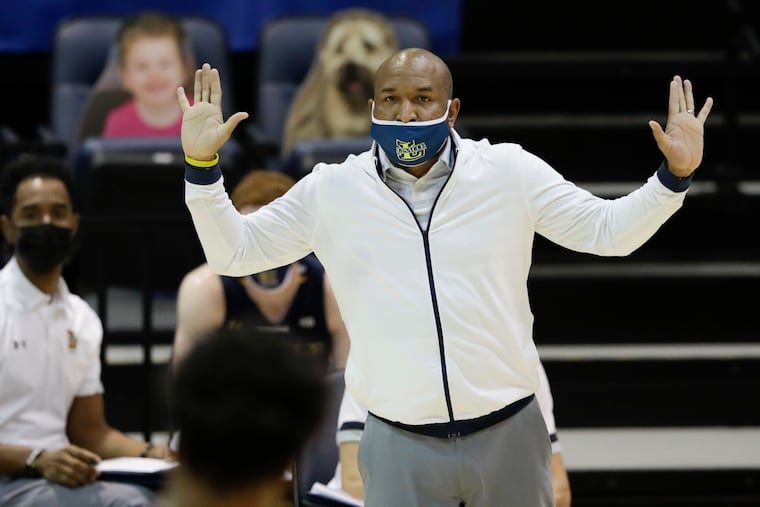Keyontae Johnson’s collapse reminded La Salle coach Ashley Howard of his own heart issues | Mike Jensen
Heart inflammation ended Howard's college playing career. He remembers how devastated he was when that happened, but he's grateful that his life was ahead of him.

At the shootaround before Saturday’s game at Drexel, La Salle coach Ashley Howard stood in his old college gym, talking to his assistants.
“This is the spot,” Howard remembers telling them. “This is the spot that ended my career.”
Not because of an injury.
“It was an individual workout,” Howard said, taking himself back almost two decades. “It was an intense workout. I didn’t faint. I got lightheaded and a little dizzy. I remember I didn’t eat that morning. If anyone knows Drexel’s gym, if it was 85 degrees outside, it was 120 degrees inside. I thought I was fine, but 25 minutes into the shooting drills, I’m lightheaded.”
He thought nothing more of it, until it was time for his preseason physical. There was a form to fill out. Have you ever experienced dizziness during exercise? “I just checked off yes,” Howard said. “I just remembered that day. Prior to that, I would have checked off no.”
A trainer pulled him aside as Drexel was getting into its first weightlifting session. The trainer and his coach wanted him to go see a cardiologist. Fine. He’d get checked out, get back on the court.
He never played again.
All this comes back whenever he sees an athlete has a heart problem. The very same day as that shootaround conversation, it all came flooding into his head again. His first thought, Howard said, when he heard Florida basketball star Keyontae Johnson had collapsed during a game Saturday: “I was just hoping he didn’t pass away. So many young athletes that may have underlying conditions that we don’t know about.”
He also couldn’t help but think back.
“Counting my blessings,” Howard said Monday afternoon, right after a La Salle practice. “My heart condition was caused by a virus when I was in college. Not knowing whether Keyontae had COVID at any point in time. Just hoping it wasn’t COVID.”
Howard had no doubt Florida had thoroughly checked athletes before allowing them on the court. Still, his thoughts are formed by his experiences, how issues pop up suddenly and become life-altering. His own tests, Howard said, found he had an extremely low ejection fraction, a measurement of how much blood the left ventricle pumps out with each contraction.
“It’s since corrected itself,” Howard said.
Howard had assumed he’d recover in time to play. He’d averaged 8.9 points and 4.9 assists as a Dragons sophomore point guard.
“I was in the best shape of my life,” Howard said. “Outside of that one day, I could run for days, play all day and all night.”
When Ashley got the word his career was over, his father, Mo, told me in 2018, “He lets out a scream that I can hear now. I felt so helpless for the guy because there was nothing I could do. He sort of turned inward.”
Howard figured it out. He’d transfer, find a place that would let him play. His Drexel coach, Bruiser Flint, told him he could transfer, but Flint wasn’t going to sign anything.
“Bruiser told me, ‘You can get a second, third or fourth opinion; I’m not signing the release, because if something happens to him, I’ll never be able to face you,’” Mo Howard said. “Every time I see Bruiser, I thank him.”
Flint made Howard a student assistant coach, started him on a path to where he is now.
Howard expressed a gratefulness not just to his coach and his trainer and the doctors, but to his young self. He easily could have ignored that box he checked.
“I encourage all people, young people, or if your children are getting checked out … I encourage student-athletes to not ignore signals,” Howard said. “Tell your trainer, tell your coach. You never know.”
The case of Keyontae Johnson is so scary. The Associated Press reported that Johnson, the preseason pick for Southeastern Conference player of the year, a projected first-round NBA draft choice in 2021, had COVID-19 this summer, but his grandfather told USA Today he wasn’t sure of that. Nobody knows right now if there is any connection. Right now, all of sports and much of society are watching, seeing the report that Johnson had been put in a medically induced coma, but that he is now responding to simple commands.
On Tuesday, Florida released a statement from Johnson’s parents, noting Jonhson was in stable condition, “breathing on his own and speaking with us and with his doctors here at UF Health. He even FaceTimed the team!”
In this year of uncertainty, some welcome news.
“I told our players, if anyone got COVID, I would seriously consider redshirting them for the year,” Howard said. “Until we know that everything was OK.”
Yes, Howard’s history factors in. How devastated he was to have to stop playing, how thankful he is “just to have a life.”
As it happens, Howard has an appointment with a cardiologist on Thursday.
“Routine checkup,” La Salle’s coach said. “But it’s important.”